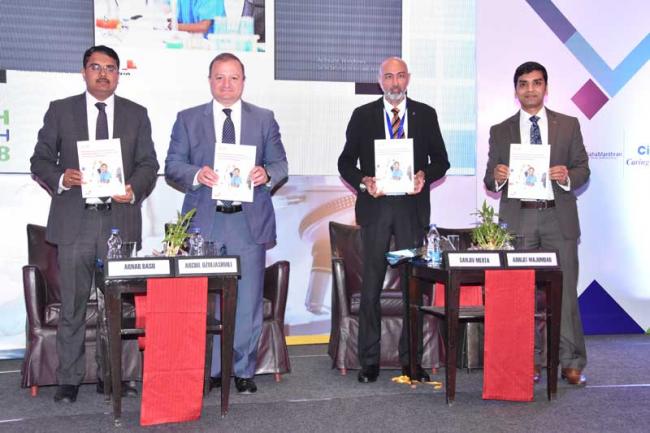
PWC releases thought paper on occasion of Health Tech 2018 organised by The Bengal Chamber, Medica Hospital
Kolkata, Mar 9 (IBNS): A digital disruption is required in order to radically change the way Indian healthcare ecosystem operates and emerging technologies have the potential to positively impact the healthcare ecosystem according to a new report released by the Bengal Chamber of Commerce & Industry and PricewaterhouseCoopers.
The report titled “Reimagining the possible in the Indian healthcare ecosystem with emerging technologies” was launched at the Health Tech 2018.
It noted that Indian healthcare ecosystem faces numerous challenges like shortage of qualified doctors and nurses, skewed access to healthcare facilities across India, patients not acting proactively for disease prevention.
PwC conducted Healthcare IT Survey 2018 with senior executives from leading healthcare providers in India to understand their views on current technology adoption in Indian healthcare ecosystem, emerging technologies use cases adopted, challenges faced and expected changes.
This knowledge paper presents analysis of the survey and PwC’s point of view to improve the adoption of AI and IoMT in Indian healthcare ecosystem.
Key barriers to expanding AI and IoMT adoption in India include:
1) Absence of a healthcare regulatory body: There is no healthcare regulatory body in India. In the absence of adequate regulations, there is concern among healthcare providers regarding the reliability of medical devices and thus practitioners prefer to use traditionalmedical devices. Although the Medical Devices Rules, 2017, became effective on 1 January 2018, their effectiveness is yet to be seen.
2) Low collaboration between various stakeholders: Although the Government of India has set up standards for sharing statistics among healthcare providers, the sharing of clinical data between healthcare stakeholders still seems a farfetched goal in India. In some cases, the sharing of informationwithin the same entity is not seamless as some big hospital chains in India are using different Hospital Information Systems(HIS) across different locations.
3) Unaffordability: While there are some big players in the AI and IoMT space that provide quality solutions and reliability in terms of their longevity, their solutions are notwell-priced.
4) Privacy and security of data:Privacy and security of healthcare data is a major concern in the absence of adequate laws. Many medical devices in the healthcare ecosystem run on public networks and there are no regulations for ensuring secure management of such data. There is concern and confusion regarding legal aspects tracking patient location.
5) Unavailability ofrelevant data: To develop highly accurate AI predictions, a gigantic amount of labelled data is required to train the underlying models. Further, this data needs to have parameters similar to the one for which it needs to make predictions.The lack of India-specific clinical data was a shared concern from the CxO community. Further, the cost of collecting and testing this data (e.g. collecting genome data) is enormous.
“The purpose of this summit is to bring all healthcare applications in one platform with international presence, B2B pavilions, exhibitions and seminars. The Health Tech is one of a kind event in this sector in Eastern India. It is an excellent platform for inviting and taking forward business collaboration with foreign partners,” said Dr. Alok Roy, Past President , The Bengal Chamber of Commerce and Industry, Chairman, Medica Group of Hospitals, the co organiser of the conference.
“The Chamber has a proactive IT Committee that includes developers, corporate and consultants. It always endeavoured to connect technology end users with developers in co creating better environment for systems with better enterprise planning, easier manufacturing process, and faster services at lesser costs. Above all the Chamber acts as co player with state government as a promoter and facilitator of all programs of sustainable growth,” said Arnab Basu, Chairperson, IT Committee, the Bengal Chamber and Partner and Technology Consulting Leader, PricewaterhouseCoopers Pvt. Ltd.
Support Our Journalism
We cannot do without you.. your contribution supports unbiased journalism
IBNS is not driven by any ism- not wokeism, not racism, not skewed secularism, not hyper right-wing or left liberal ideals, nor by any hardline religious beliefs or hyper nationalism. We want to serve you good old objective news, as they are. We do not judge or preach. We let people decide for themselves. We only try to present factual and well-sourced news.







